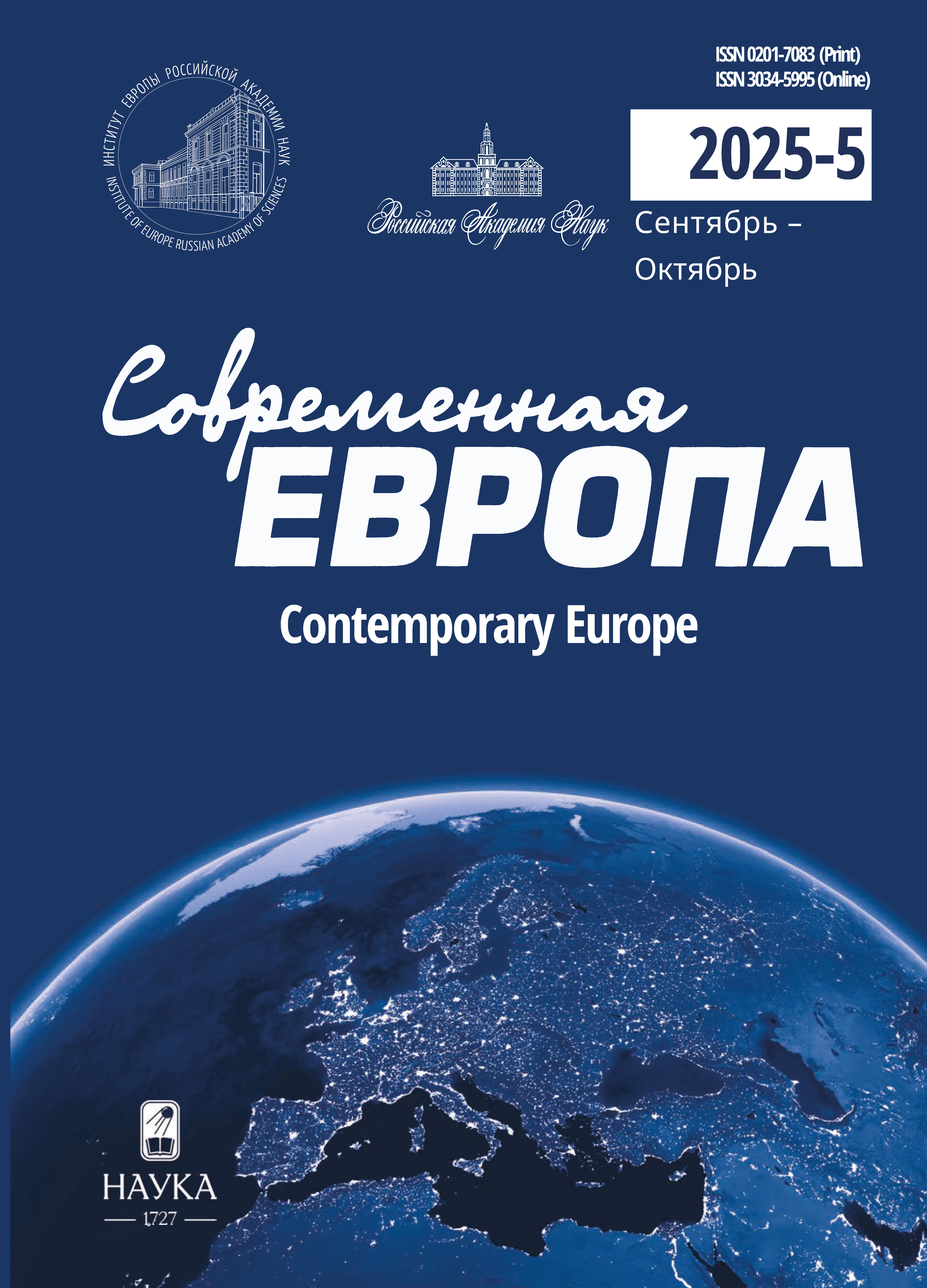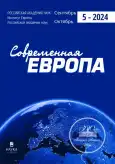Franco-Moldovan Relations at the Present Stage
- Authors: Entina E.G1, Davranova S.B2
-
Affiliations:
- Institute of Europe of the Russian Academy of Sciences
- Higher School of Economics
- Issue: No 5 (126) (2024)
- Pages: 88-97
- Section: EUROPEAN PROCESS: COUNTRIES AND REGIONS
- URL: https://rjsvd.com/0201-7083/article/view/652317
- DOI: https://doi.org/10.31857/S0201708324050073
- ID: 652317
Cite item
Abstract
Despite the growing relevance of the case of Franco-Moldovan relations, little atten-tion has been paid to their study outside the context of European integration processes. This study seeks to fill this gap by identifying and summarizing the current status, specificity and con-text of French foreign policy in Moldova, the key interests of the parties towards each other, as well as the main challenges and tasks they are facing. The results of the study show that until 2021, the bilateral dynamic was rather inert. The Republic of Moldova (RM) did not rank high in the system of Paris's foreign policy priorities even after the sharp increase in the confrontation between the Russian Federation and the EU in 2014. Although the Moldovan vector of French foreign policy is now ranked alongside other post-Soviet countries, the results show that the starting position from which France's activation in RM began is very different from the inputs that for many years shaped the French geopolitical optics in other parts of the former USSR ‒ in the Caucasus and even in Central Asia. The year 2021 has become a reference point in this relationship because a political configuration favorable to France has begun to emerge in Moldova. For Chisinau, the need to gain favor with Paris is critical in the context of its stated goals of European integration. In the case of France, the motivation looks much more multilayered, but it is summarized by Paris's desire to take the Moldovan plot into circulation in order to reassemble its self-positioning as a leader in the EU.
About the authors
E. G Entina
Institute of Europe of the Russian Academy of Sciences
Email: e.entina@hse.ru
ORCID iD: 0000-0003-4198-4870
Doctor of Sciences (Politics), Head of the Department of Black Sea-Mediterranean Studies; Professor Moscow, Russia
S. B Davranova
Higher School of Economics
Email: sbdavranova@hse.ru
ORCID iD: 0009-0007-4174-8348
Analyst at the Center for Mediterranean Studies Moscow, Russia
References
- Осипов Е.А. (2022) Франция и вопрос о возможном расширении ЕС в контексте гибкой интеграции. Международный журнал гуманитарных и естественных наук. Т. 10. № 1(73). С. 50–55.
- Osipov E. A. (2022) Frantsiya i vopros o vozmozhnom rasshirenii ES v kontekste gibkoi integratsii [France and the issue of possible EU enlargement in the context of flexible integration], Mezhdunarodnyi zhurnal gumanitarnykh i estestvennykh nauk, 10, 1(73), pp. 50–55. (In Russian).
- Тимофеев П.П. (2013) Политика Франции на постсоветском пространстве. Современная Европа. № 2. С. 86–100.
- Timofeev P.P. (2013) Politika Frantsii na postsovetskom prostranstve [French policy in the post-Soviet space], Sovremennaya Evropa, 2, pp. 86–100. (In Russian).
- Чихачев А.Ю. (2022) После Сахеля: закат французского интервенционизма? РСМД. 09.12. URL: https://russiancouncil.ru/analytics-and-comments/analytics/posle-sakhelya-zakat-frantsuzskogo-interventsionizma/?ysclid=lyt15jsnnh772986492 (дата обращения: 19.07.2024).
- Chikhachev A.Yu. (2022) Zakat frantsuzskogo interventsionizma? [After the Sahel: the decline of French interventionism?], RSMD, 09.12. URL: https://russiancouncil.ru/analytics-and-comments/analytics/posle-sakhelya-zakat-frantsuzskogo-interventsionizma/?ysclid=lyt15jsnnh772986492 (accessed: 19.07.2024). (In Russian).
- Яковлев М.М. (2024) Частные военные компании и частные разведкомпании. Прошлое, настоящее и будущее. Буки Веди, Москва. 116 с.
- Yakovlev M.M. (2024). Chastnye voennye kompanii i chastnye razvedkompanii. Proshloe, nastoyashchee i budushchee [Private military companies and private intelligence companies. Past, present and future], Buki Vedi, Moscow, Russia. (In Russian).
- Całus K., Kosienkowski M. (2018) Relations between Moldova and the European Union. The European Union and its Eastern Neighbourhood: Europeanisation and its twenty-first-century contradictions. Ed. by P. Flenley, M. Mannin. Manchester University Press, Manchester, UK. P. 99–113.
- Chikhachev A.Yu. (2023) France’s strategy in the Baltic region: military and political aspects. Baltic Region. Vol. 15(1). P. 4–17.
- Grigoriadis T., Gaibu S. (2019). Economic Models of Aid Effectiveness in Moldova. Expert-Grup, Centru Analytic Independent, Berlin, Germany. P. 1–35.
- Parmentier F. (2012). France: Unfulfilled Potential as a Major EU Partner of Moldova. Moldova. Arena of International Influences. Ed. by M. Kosienkowski, W. Schreiber. Lexington Books, Lanham, UK. P. 77–87.
- Saverio Montesano F., van der Togt T., Zweers W. (2016) The Europeanisation of Moldova: Is the EU on the Right Track? Netherlands Institute of International Relations “Clingendael”, Hague, Netherlands. 28 p.
Supplementary files











